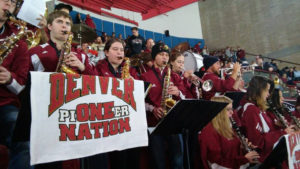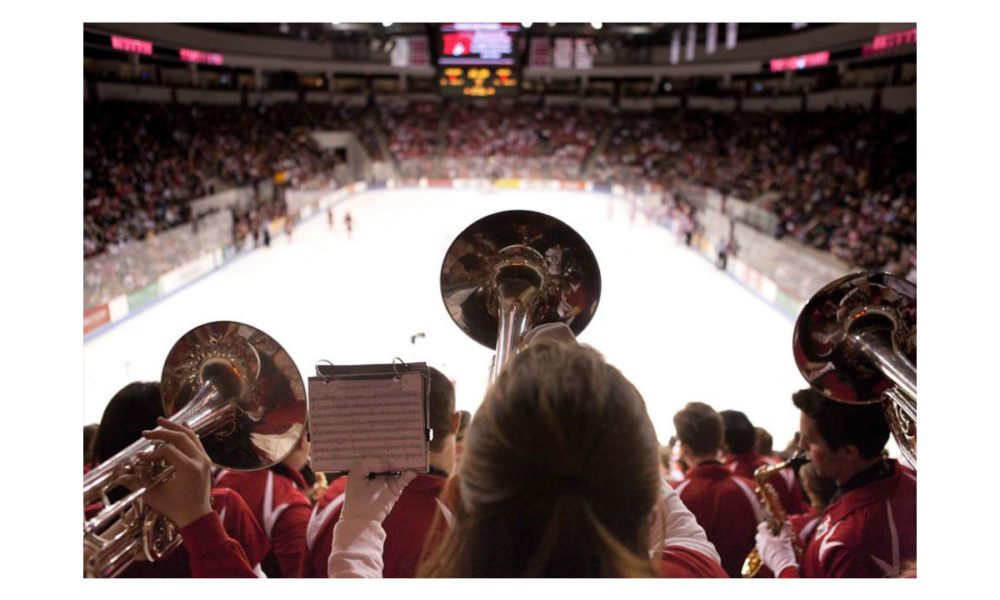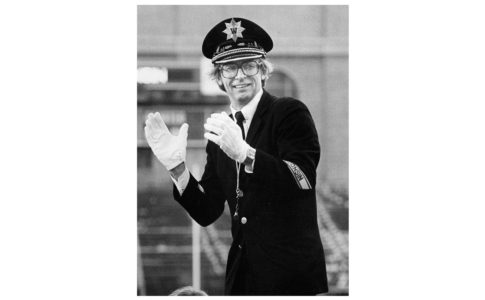On many college campuses, bands venture into the hockey arena—and even onto the ice rink—to pump up the crowd.
Boston University (BU) senior Jacob Levy had never seen a hockey game until he joined the school’s pep band and began performing at the men’s and women’s hockey games.
 “I was a little wary of playing at hockey games just because I didn’t even know what it was about, but then when I showed up, I found out it was a lot of fun,” he says.
“I was a little wary of playing at hockey games just because I didn’t even know what it was about, but then when I showed up, I found out it was a lot of fun,” he says.
The BU Pep Band performs at more than 100 athletic and community events every year, but Aaron Goldberg, director of athletic bands, says the hockey games are some of his and the students’ favorite performances.
Boston University is not the only school performing at hockey games though. College and high school marching and pep bands are braving the colder temperatures, some of them even taking their shows to the ice.
The Soundtrack of Game Day
Performing at hockey games is similar to other athletic events where pep bands perform traditional songs like the fight song or alma mater along with energetic, current tunes. With hockey games, though, playing can be more frequent than in basketball games and involve shorter playing periods.
Musicians need to be constantly on the edge of their seats, ready to perform at any second. They also need to pay attention to the temperature of the ice arena. Compared to a football stadium or basketball arena, a hockey rink stays between 50 to 60 degrees.
Goldberg says that while the temperature and shorter playing times influence pep bands at hockey games, the major component is placement.
At Boston University, the 130-member pep band is split into two sections, red and white bands, comprising of about 60 members each with full instrumentation. The two bands alternate performing at hockey games as well as other athletic and community events.
Even though about 60 students play at each hockey game, Goldberg says the metal ceiling amplifies the sound, so that everyone in the arena can hear the tunes. He describes the pep bands as the “soundtrack of the game day experience.”
The energy from the student section spills out onto the ice, influencing the hockey players and the games, which is why the pep band’s goal is to get the entire student section dancing, clapping, chanting, and singing along.
Goldberg says that there is a science behind knowing what songs to pick during certain times of the game, whether it be playing “All I Do Is Win” when the Boston University hockey team scores three goals with 30 seconds left on the clock or pumping up the crowd with “We Will Rock You” and “My Songs Know What You Did in the Dark (Light Em Up).”
“We know the right tunes to play when, and the band can really positively change the energy of the arena,” he says. “I’ve seen so many times in my years at BU where the pep band has a direct impact on the game based on what we play, when we play it, and how we play it. It’s almost scientific how we know the reaction we’re going to get out of fans and how that’s going to affect the energy of the game.”
Worth a Goal and a Half
Hockey players can feel that school spirit and feed off the energy, and Goldberg says he has been told the pep band was worth “a goal and a half at a home game.”
The best compliment the BU Pep Band has received was from a hockey player who was drafted by the National Hockey League team the Boston Bruins. When asked what his favorite part was about playing at Boston University, he says it was when he came out of the tunnel and heard the BU Pep Band playing the fight song, Goldberg recalls.
“As you can imagine, the whole band was just swooning hearing that,” Goldberg says. “It was a major honor.”
 Almost 2,000 miles away, the Pioneer Pep Band at the University of Denver strives to bring that same student energy to their hockey games. The Pioneer Pep Band ranges from 15 to 35 voluntary players and performs at hockey, basketball, lacrosse, and volleyball games.
Almost 2,000 miles away, the Pioneer Pep Band at the University of Denver strives to bring that same student energy to their hockey games. The Pioneer Pep Band ranges from 15 to 35 voluntary players and performs at hockey, basketball, lacrosse, and volleyball games.
The Pioneer Pep Band not only performs in the stands but will also greet people as they enter the arena, says Joseph Walsh, director.
Musicians in the Pioneer Pep Band enjoy being an important part of the athletic game experience.
“It’s not just being a fan or player but being a participant in the game that’s going on,” Walsh says. “Whether you’re in a marching band at a football game at some big-time school or in a pep band at a hockey game, it’s a really great, fun experience for any college student.”
Learning from the Colleges
That energy and school spirit does not happen only at a college level, though. The 45-member English High School marching band in Boston paired up with the BU Pep Band for a couple of years to echo this energy and school spirit.
The partnership began three years ago when a few BU Pep Band members performed with The English High School band for the high school’s homecoming football game. The high school band then toured the university’s music department and attended a hockey game to watch the BU Pep Band in action.
Musicians from The English High School band rehearsed with the BU Pep Band and learned some of the tunes before the game. Exposing the high schoolers to the BU Pep Band gave them a better understanding of what it took to be a “professional performer” and spur energy at athletic events, says music teacher David Carkner.
Marching on Ice
To spice things up, both the BU Pep Band and BU Marching Band will take their performances to the ice. Since Boston University lacks a football team, Goldberg says the ice show is the only way students can march in front of thousands of people in their own campus arena. Typically, the school’s marching band, consisting of 60 to 80 musicians, performs field shows at college festivals and in exhibition at high school marching competitions in addition to community functions.
The ice shows first began with the marching band in 2010 when musicians donned ice cleats and slowly walked across the ice to spell out “Go BU.” After the success of the first show, Goldberg offered the BU Pep Band the chance to do their own shows. Over the last eight years, the shows have evolved, now including ice skaters and the full drumline.
To make marching on ice successful, the band members first memorize the music before putting together the formations. When creating the formations, the band staff ensures the step sizes are small, so they aren’t putting students at risk of injuring themselves, Goldberg says. He adds that the students have a say in the formations and shows.
“Ultimately, they’re the ones out there performing in uniform, representing their band, so it’s important for us that we have everyone on the same page and proud of what we’re doing,” he says.
When Joe McMahan joined the BU Pep Band his freshman year, he did not know marching on ice was possible. Now, four years later, he says it’s something he looks forward to every year. “It’s a completely different environment than anything else I’ve performed in,” says McMahan, a senior flute section leader. “I’ve played in concert halls and stands of athletic events. Being on ice and playing, that just completely throws everything out of order. It’s a crazy chaos because there is always the danger of us falling over, but it’s also a good chaos.”
Levy, currently a trumpet section leader, says that he first heard about the ice show when he was a freshman and instantly wanted to try it. He adds that college is about new experiences, and he wanted the ice show to be one of those. After doing it for four years, he says that the crowd’s reactions make each performance memorable.
“The crowd always gets into it because it’s something unique, and you don’t get to see a band on ice very often,” Levy says.


